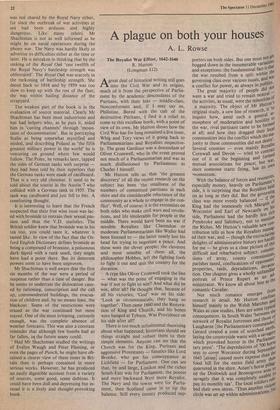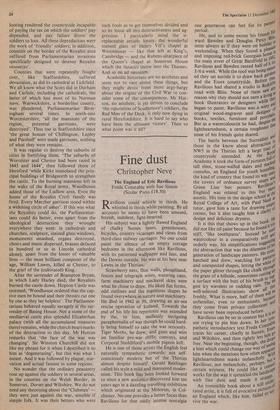A plague on both your houses
A. L. Rowse
The Royalist War Effort, 1642-1646 R. Hutton (Longman £12)
Agreat deal of historical writing still goes into the Civil War and its origins, much of it from the perspective of Parlia- ment by the academic descendants of the Puritans, with their bias — middle-class, Nonconformist and, if I may say so, Philistine. Bored with the cult of the destructive Puritans, I find it a relief to come to this excellent book, with a point of view of its own. Mr Hutton shows how the Civil War has for long remained a live issue, Whig and Tory views of it going back to Parliamentarians and Royalists respective- ly. The great Gardiner was a descendant of Oliver Cromwell, who in the event proved not much of a Parliamentarian and was as much disillusioned by Parliaments as Charles 1 himself.
Mr Hutton tells us that 'the greatest discovery' of all the recent research on the subject has been 'the smallness of the numbers of committed partisans in each shire and the considerable reluctance of the community as a whole to engage in the con- flict'. Well, of course: it is the extremists on both sides who make civil wars and revolu- tions, and life intolerable for people in the middle. There would have been no war if sensible Royalists like Clarendon or moderate Parliamentarians like Waller had been listened to — the latter nearly lost his head for trying to negotiate a peace. And these were the clever people; the cleverest and most sensible of them all, the philosopher Hobbes, left the fighting fools to fight it out and quit the country for the duration.
A type like Oliver Cromwell took the line — what was the point of engaging in the war if not to fight to win? And what did he win, after all? He thought that, because of all his victories, 'God' was on his side: 'Look at circumstantials, they hang so together'. Then came 1660 and the Restora- tion of King and Church, and his bones were hanged at Tyburn. Was Providence on his side after all?
There is too much infinitesimal theorising about what happened; historians should see things straight and reduce them to their simple elements. Anyone can see that the Church was for the King, Puritans and aggressive Protestants — fanatics like Lord Brooke, who got his comeuppance at Lichfield — for Parliament. One can see that, by and large, London and the richer South-East was for Parliament, the poorer and more backward West more Royalist. The Navy and the towns were for Parlia- ment, then Scotland came in to tip the balance. Still every county produced sup- porters on both sides. But one must not get bogged down in the innumerable variations and exceptions: the fundamental fact is that the war resulted from a split within the governing class over various issues, and was a conflict for power, as always in. politics. t
The great majority of people did no want a war and tried to remain neutral --1 the activists, as usual, were the minorities of ' a majority. The object of Mr Hutto original study, a new tine of research, 15 — general at inquire how, amid such a mosphere of moderation and hostility t° the war, rival partisans came to be fortned at all; and how they dragged their local communities into the conflict which the jority in those communities did not desire •
RoYalis Several counties even mainly t Cornwall and Devon — tried to contract, out of it at the beginning and forineu mutual associations for peace; but war' once someone starts firing, has its °v111 momentum. With the balance of forces and resources,' especially money, heavily on Parliament ! side, it is surprising that the Royalists helu on as long as they did. But the governing class was more evenly balanced if thef King had the immensely rich Marquis ' ,°, Worcester and Earl of Newcastle on nib side, Parliament had the hardly less ric Pembroke and Salisbury, not to mention the Riches. Mr Hutton's valuable new eoll' tribution tells us how the Royalists Mar°. ed their war, and — though the excruciating, delights of administrative history are harcilYs for me — he gives us a clear picture of thl difficult and rebarbative subject: is- difficult of array, county commissions: ents parishes taxed, confiscations of oPPon properties, raids, depradations, devas!a; tion. One chapter gives a wholly unfamiliar portrait of Prince Rupert as an aL'e ministrator. We know all about him as tu romantic Cavalier. Not much romance emerges fr°111, research in detail. Mr Hutton confine! himself mainly to the Welsh Marches aril Wales as case studies. Here are some tYPe!,, consequences. In South Wales 'between to', network of Royalist fortresses and those oni Laugharne [the Parliamentary commarlde,,, Gerard created a zone of scorched arty., laying the countryside waste with a savagerY which provoked horror in the Parliatnens; tary press'. 'The depredations of 700 h°Ler sent to cover Worcester during Septa"' e 1643 [alone] caused more expense than lhri food bill for the entire field arnlY quartered in the shire. Aston's horse Pillar: ed the Droitwich and Bromsgrove area Su,‘ savagely that it was completely unable !`: pay its monthly tax'. The local soldiers rouns bed their own shires. 'Thus another vicio_i circle was set up within administrations, 1°
looting rendered the countryside incapable of paying the tax on which the soldiers' pay depended, and pay failure drove the soldiers to loot. All these depredations were the work of 'friendly' soldiers; in addition, counties on the border of the Royalist area suffered from Parliamentarian invasions specifically designed to destroy Royalist resources'.
Counties that were repeatedly fought over, like Staffordshire, suffered devastaion, as did its cathedral at Lichfield. We all know what the Scots did in Durham and Carlisle, including the cathedrals, the latter of which lost most of its Norman nave. Warwickshire, a borderline county, was plundered, Parliamentarian Birm- ingham several times. In north-east Worcestershire, 'all the mansions of the region, potential garrisons, were destroyed'. Thus too in Staffordshire since 'the great houses of Chillington, Lapley and Patshull' were made garrisons, nothing of what they were remains.
It was regular to destroy the suburbs of cities in fortifying them. 'The suburbs of Worcester and Chester had been razed in 1643 and 1644', then followed those of Hereford 'while Kirke immolated the prin- cipal buildings of Bridgnorth to strengthen the castle. To the burning mansions left in the wake of the Royal army, Woodhouse added those of the Ludlow area. Even the home of the Royalist Croft family was fired. Every Marcher garrison stood within a widening circle of ashes'. If this was what the Royalists could do, the Parliamentar- ians could do better, even apart from the ideological destruction they wrought everywhere they went: in cathedrals and churches, sculpture, stained glass windows, monuments smashed, organs destroyed, choirs and music dispersed, brasses defaced (a hundred or so in Lincoln cathedral alone); apart from the losses of valuable lives — the most brilliant composer of the age, William Lawes, killed at Chester, to the grief of the (cultivated) King.
After the surrender of Brampton Bryan, in which Lady Harley died, the Royalists burned the castle down. Hopton Castle was stormed; 'Woodhouse ordered that the cap- tive men be bound and their throats cut one by one as they lay helpless'. The Parliamen- tarians behaved equally savagely at the sur- render of Basing House. Not a stone of the mediaeval castle plus splendid Elizabethan palace (with all the accumulated treasures there) remains, while the church bears marks of the destruction to this day. Mr Hutton remarks that 'the face of the war was changing'. Sir Winston Churchill did not like my phrase for it when I.described it to him as 'degenerating', but this was what I meant. And it was followed by plague, star- vation and actual famine in some regions.
No wonder that the ordinary peasantry rose up against the soldiery in several areas, in the counties on the Welsh Border, in Somerset, Dorset and Wiltshire. We do not need any theorising about the 'Clubmen' — they were just against the war, sensible if simple folk. It was their betters who were such fools as to get themselves divided and so let loose all this destructiveness and ag- gression. I particularly mind the ir- replaceable artistic losses: the wonderful stained glass of Henry VII's chapel at Westminster — like that left at King's, Cambridge — and the Rubens altarpiece of the Queen's chapel at Somerset House which the fanatics threw into the Thames. And so on ad nauseam.
Academic historians are no aesthetes and seem not to care about these things, but they might desist from more argy-bargy about the origins of the Civil War to con- sider some of the consequences. Mr Hut- ton, no aesthete, is yet driven to conclude 'the reputation of Scudamore's soldiers, the Red Men of the Dusk, is only now dying in rural Herefordshire. It is hard to say who have been the ultimate victors'. Then to what point was it all?











































 Previous page
Previous page